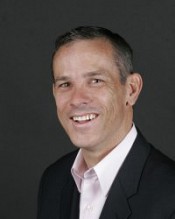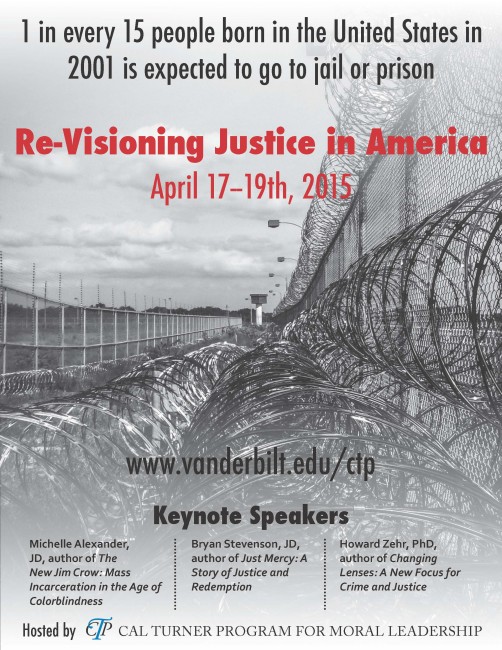“We’ve got a problem.”
by Graham Reside, Executive Director, Cal Turner Program in Moral Leadership in the Professions
 I’m a middle-aged white guy, who grew up in the suburbs of Toronto, Canada. The son of a minister, I went to church every Sunday, and I’ve heard a lot of sermons in my life. Growing up evangelical, I know the Bible pretty well. So I was well familiar with Matthew 25, and Jesus’ discussion of sheep and goats. Sheep are those who visit the sick, feed the hungry, clothe the naked, and visit those in prison. Goats don’t. I’ve been a goat for most of my life. But this past year I met a sheep, who invited me to join him. His name is Joe Ingle. He took me to death row, and he has introduced me to a bunch of other sheep. And because I’m an academic, those sheep recommended a few books for me to read. The first one was Michelle Alexander’s The New Jim Crow: Mass Incarceration in the Age of Colorblindness. My new friends and that book taught me painful truths that I had too easily neglected to see for most of my life.
I’m a middle-aged white guy, who grew up in the suburbs of Toronto, Canada. The son of a minister, I went to church every Sunday, and I’ve heard a lot of sermons in my life. Growing up evangelical, I know the Bible pretty well. So I was well familiar with Matthew 25, and Jesus’ discussion of sheep and goats. Sheep are those who visit the sick, feed the hungry, clothe the naked, and visit those in prison. Goats don’t. I’ve been a goat for most of my life. But this past year I met a sheep, who invited me to join him. His name is Joe Ingle. He took me to death row, and he has introduced me to a bunch of other sheep. And because I’m an academic, those sheep recommended a few books for me to read. The first one was Michelle Alexander’s The New Jim Crow: Mass Incarceration in the Age of Colorblindness. My new friends and that book taught me painful truths that I had too easily neglected to see for most of my life.
My favorite poem is “A Ritual We Read to Each Other,” by William Stafford, and in it, Stafford writes: “I call it cruel and maybe the root of all cruelty to know what occurs but not recognize the fact.” The witness of Reverend Ingle and friends, along with Alexander’s book forced me to recognize some difficult facts. Just one fact should be enough to get us to re-think how we do things in this country: One in every three African American males born in this century will be incarcerated in their lifetime. And the social and psychological effects of this simple fact are cascading and profound. Here’s another one: The United States incarcerates 2.2 million of its citizens—more than any other nation in the world. And finally, our crime rates do not account for our incarceration rates. What, in God’s name, are we going to do about that?
At Vanderbilt Divinity School, I direct the Cal Turner Program for Moral Leadership in the Professions. Our program is dedicated to developing leaders who have a strong moral purpose. For me, this means developing in ourselves and others the capacity to recognize the truth in its fullness, and to do something about it. Fortunately, there are a lot of strong moral leaders in Nashville, including folks here in our Divinity School, who work the problem of mass incarceration. For example, Dan Joranko has long been involved at Riverbend prison, and oversees our program there. Before him, Harmon Wray served as a strong theological voice for the imprisoned and organized our program here at VDS. Many students and faculty have followed in his footsteps over the years, regularly going into prisons to learn from and with inmates. Other students and faculty have worked in prisons, visiting, ministering, and bringing the gospel to and from those places. And there are people here and around Nashville working tirelessly to make us more aware of the simple fact: when it comes to incarceration in the United States, we have a big problem. It is a problem of injustice in the very structure of our justice system—2.2 million people are in prison. And they have families. If you are black or brown, you are much more likely to suffer the consequences of this system, which is dehumanizing and debilitating. Prison is hell. Crime and punishment are not aligned, nor fairly distributed.
The Cal Turner Program wants to do something in response to the leadership we see here at the Divinity School and in our community, to help address the problem of mass incarceration. We don’t have any expertise, but we do know how to get people together, so we are doing what we can. We organize lunches, convene working groups, and strive to listen to those who work more closely on the issues and in the prisons.
As part of this effort, we are organizing a conference, entitled Re-visioning Justice in America. It will be held April 17-19th. It will bring people from across the country and provide opportunities for learning and sharing best practices around issues of mass incarceration, race and new possibilities for justice. Keynote speakers include:
Michelle Alexander, JD, a highly acclaimed civil rights lawyer, advocate, and legal scholar, and author of The New Jim Crow: Mass Incarceration in the Age of Colorblindness.
Bryan Stevenson, JD, founder and Executive Director of the Equal Justice Initiative, professor at New York University School of Law, and author of Just Mercy: A Story of Justice and Redemption.
Howard Zehr, PhD, pioneer in restorative justice, professor at Eastern Mennonite University and author of Changing Lenses: A New Focus for Crime and Justice.
In addition, we will be offering several presentations, panels and workshops, addressing a variety of topics, including racial discrimination in sentencing, the business of mass incarceration, the Cradle to Prison Pipeline, the possibilities and challenges of education in prisons, advocacy for the incarcerated and their families, post-incarceration discrimination, theological resistance to the death penalty, and reforming public policy.
Here at Vanderbilt Divinity School, I am learning anew what it means to read the Bible and to pay attention. I feel fortunate to work with faculty and students who see in our religious traditions a call to advocate for justice and to act on behalf of the disadvantaged. The prison industrial complex, which has emerged over the last 40 years, has created grave injustices and a clarion call for moral leadership. Please tell us your own stories of leadership around injustice and consider joining us in our efforts to confront the problem our nation faces. It’s too easy to read our sacred texts, to observe the signs around us, and not recognize the fact. Sometimes, just paying attention is an act of moral leadership. It’s time for the sheep to show up.
